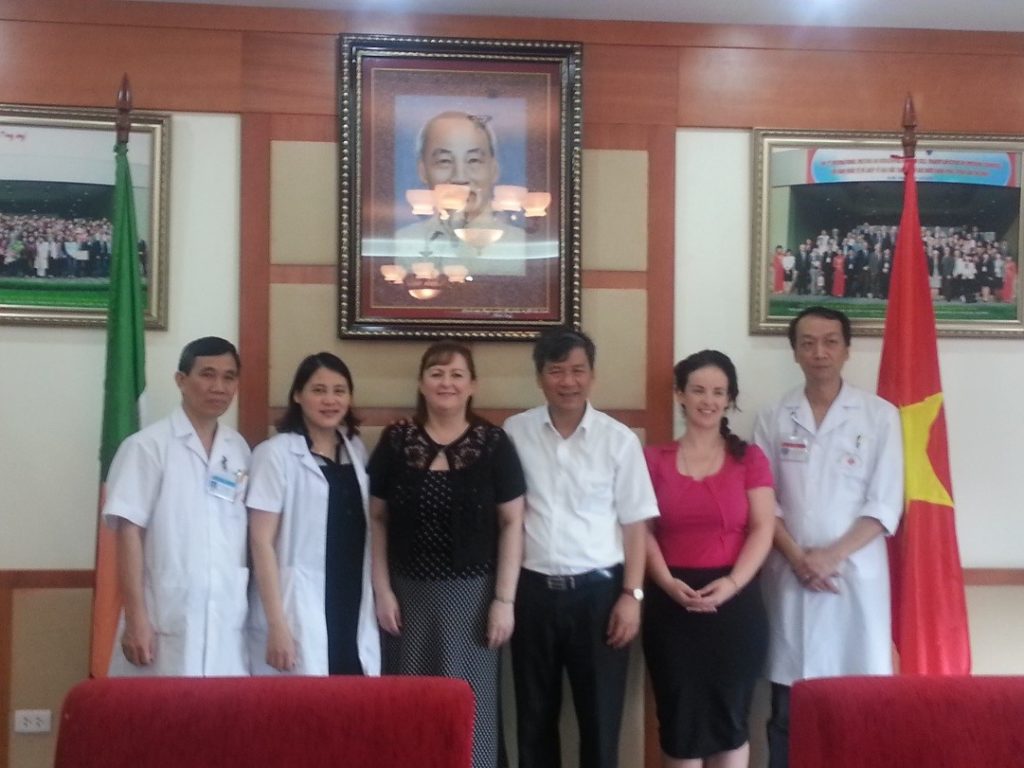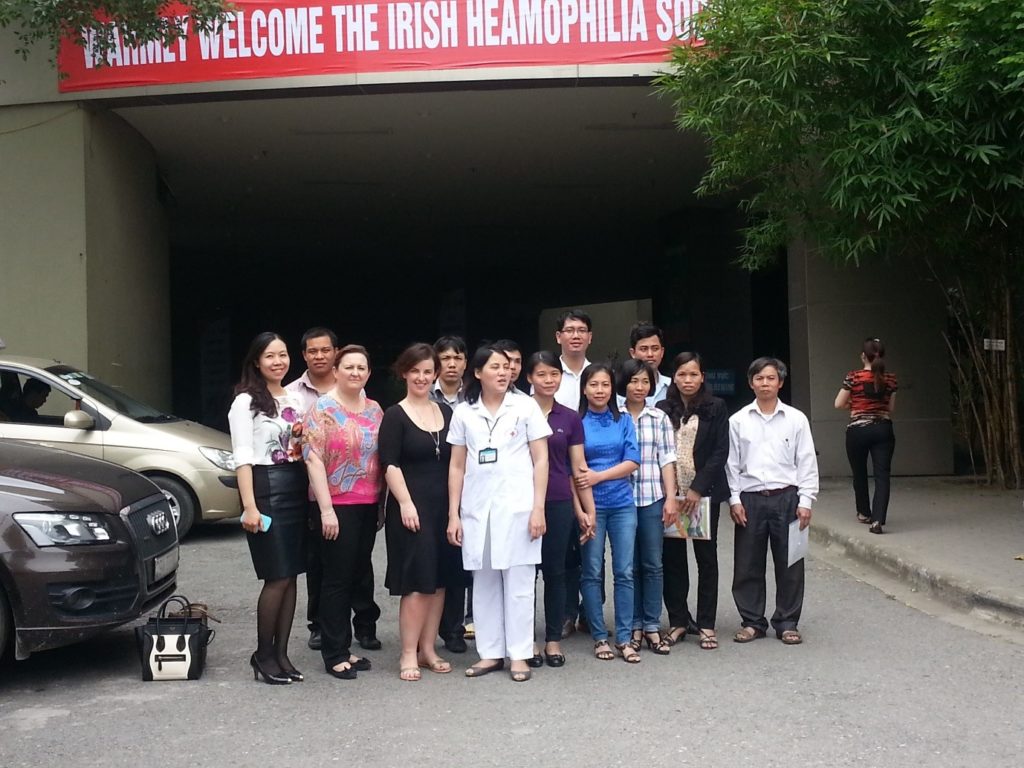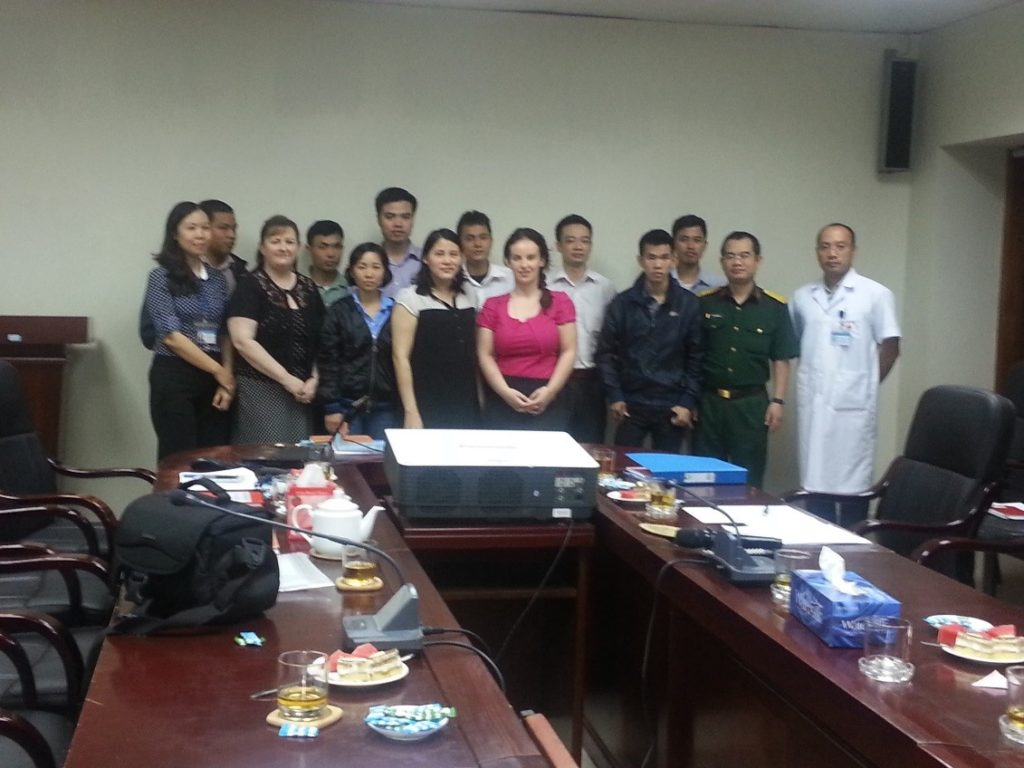Fiona Brennan and I travelled to Vietnam in early May to spend some time working with our twinning partners. After a very long day travelling we were met at the airport by the smiling face of Ms. Anh who kindly brought us to our hotel for some rest. Later in the evening we met Ms. Anh and Ms. Bing for some dinner. The food was delicious, fresh vegetables and a mixture of traditional Vietnamese food including an unfamiliar dish ‘pigeon porridge’. It wasn’t long until we were exhausted and back at the hotel for a much needed 8 hours sleep.
The following morning started early. We arrived at the hospital and were greeted by Professor Tri, Dr. Khanh, Dr. Van, and Dr. Mai. They had erected a huge banner outside the hospital welcoming us, and in the board room where we had our welcome meeting the Irish Flag was flying high. We chitchatted, exchanged gifts and Professor Tri thanked us for our visit.
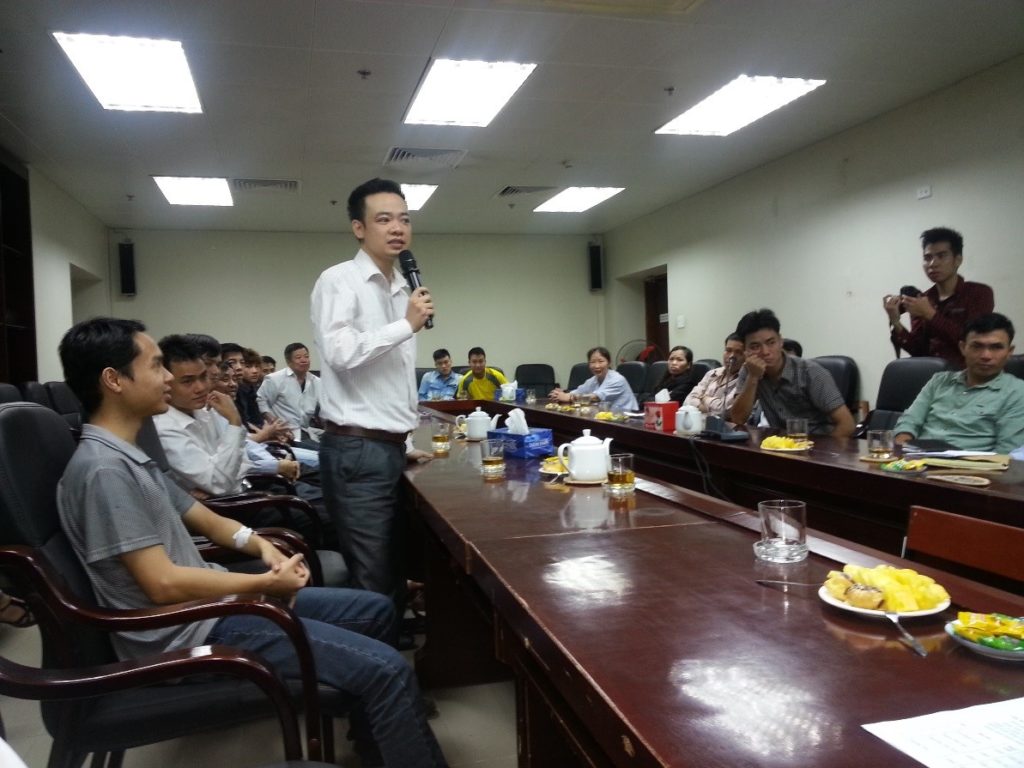
We then went to our first workshop, but before it started, Dr. Mai informed us about the guidelines for diagnosis and treatment of haemophilia in Vietnam, that the Ministry for Health had agreed on just a few weeks previously which included approval for prophylaxis and home treatment. Dr. Mai explained that once a patient is registered at the treatment centre they will be assessed in relation to their condition, including an assessment of overall muscle function in their joints and physiotherapy. Oral health will be routinely checked every 6 months and additional factor will be made available for any surgical interventions required. Genetic counselling will be offered to family members and patients will be given a one month’s supply of factor for home treatment.
At present people with haemophilia in Vietnam have to pay 20% of the cost of their treatment, with insurance paying the remaining 80%. This is impossible for most people. If the person is classified as poor, they do not have to pay but the threshold is very low. For example, if you own a television or some furniture you are not classified as being poor. However, for children up to 6 years of age treatment is covered 100%. Dr. Mai informed us that they have been pushing very hard on this situation over the past few months with the Ministry, and they are hoping to get some good news back very soon in relation to this. We were only an hour into our work and already it had been a worthwhile trip, hearing this excellent news!
We then discussed publications. We had been collaborating on a dental leaflet for adults and for children, which is nearly finalised. They are hoping to launch both these publications very soon.(Dr. Mai mentioned she recommends to her patients to see a dentist at least twice a year; however in Vietnam some dentists will not treat people with haemophilia because of a lack of training. Therefore, last year they put together a training workshop for dentists. Many dentists attended from around the country, and this has proved to be very useful).We also discussed seven publications planned for the next few years. The organisation is also very keen to start looking at producing a magazine, and we will of course, assist in any way we can with this. The plan is to launch the first magazine at the start of the Lunar year in January 2015.
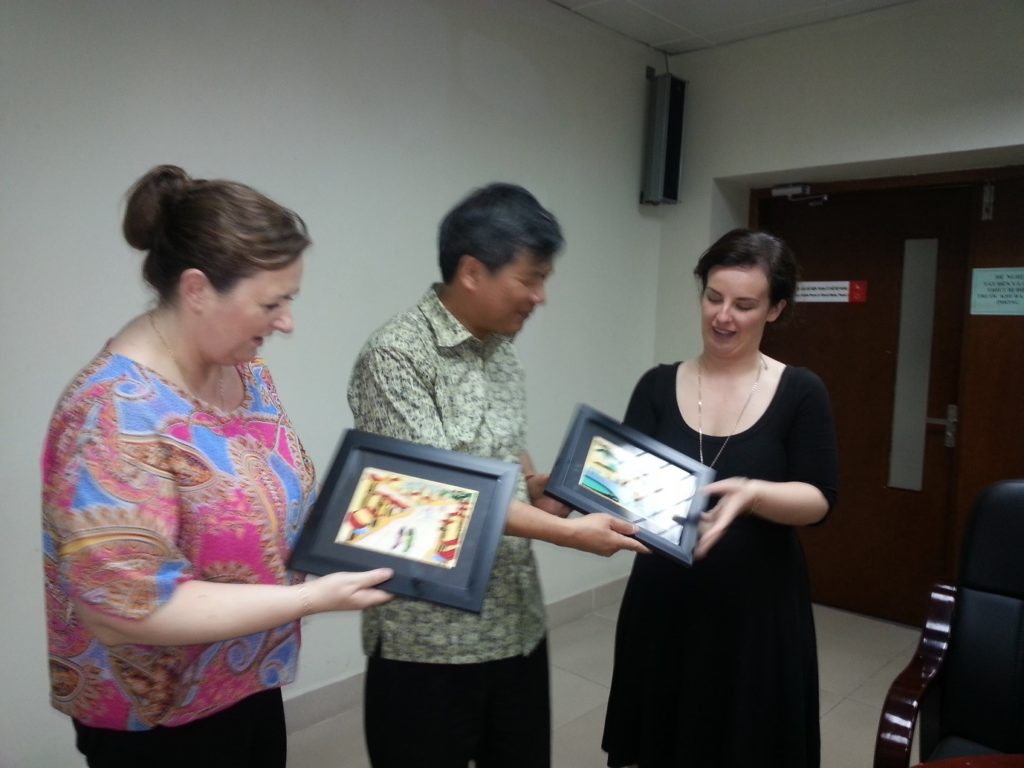
After a very interesting lunch with Professor Tri in the hospital canteen, which consisted of pork, cabbage, rice, fruit and believe it or not silk worms (don’t be shocked, yes, Fiona and I tried one and it didn’t taste too bad), we met with the hospital accountant to discuss the accounting procedures involved in relation to the logistics of the I.H.S. donating funds to the organisation regarding the home adaptation programme, whereby handrails and various equipment will be put into members homes, and the employment programme. It was good to hear that they have clear guidelines and procedures in place for same. We agreed criteria and how we can support these projects, and the simplest way that this can be organised. Ms. Hanh and Ms. Anh have done a lot of research in relation to the home adaptation programme with suppliers and we can already see that this programme will kick off very well indeed. This discussion took up most of the afternoon and is now ready to be rolled out.
Before dinner we took a quick visit to the Ethnic Museum which was really interesting, followed by a visit to a food market, followed by dinner with Professor Tri and Ms. Anh in our favourite fish restaurant (you would think we were locals!) in the city, followed by ice cream in a café overlooking the beautiful lake.
We started early again the following day with a meeting on the employment project. Dr. Mai had invited some of those members who had applied for a grant to this discussion. It is hoped that by giving some people with haemophilia a small grant to help them start up their own business, that it will encourage them to have appropriate jobs to suit their specific needs, and will make more jobs in the long run. We had already agreed criteria and assisted the organisation with application forms etc. however Professor Tri and Dr. Khanh felt that perhaps a little more research is needed on this project as maybe it would be more effective if small groups were supported instead of individuals. We agreed with this suggestion, and this will be looked at in the coming months.
In the afternoon we discussed the starting up and development of English classes for people with haemophilia and some staff. We agreed to financially support some of this project. The aim is to give people with haemophilia and some of the staff at the hospital the opportunity to learn basic English. We discussed the practicalities of this project and it was good to see the organisation wanting to take ownership of this project in relation to sourcing members, tutors, and organising the logistics of the project. Dr. Mai and her colleagues had sent out a survey, and as the response was not as good as we thought, it was agreed that they would discuss this project further in the coming months. Everyone agreed that if this project goes ahead, 100% commitment would be needed. There is definitely an enthusiastic interest in these classes, but it just needs to be looked at a little more before it is finalised.
We left the following day but before that and after a great few days working with our Vietnamese friends and colleagues it was time to conclude and finish up our discussions. During our conclusion meeting a final agreement was reached in relation to the publication schedule and the first magazine for the organisation which Professor Tri is very keen to get started. The home adaptation programme which the I.H.S will support financially through a €5,000 donation is now firmly agreed. However, Professor Tri made a very valid point that this needs to be rolled out all over the country and not just in Hanoi. We agreed with this 100%. The employment project is now going to be researched a little more before it is rolled out, as is the English classes programme.
We managed to get through a lot of work in very little time thanks to the efficiency of the organisation and keeping to the schedule. It is always a pleasure to visit our twinning partners not to mention the humbling feeling we always have leaving this beautiful country. Listening to stories from people with haemophilia here can be very hard but now there is great hope for the future for people with haemophilia. Our visits to Vietnam never disappoint, and even though our twinning programme with Vietnam finishes this year, we have agreed that our work will continue for the foreseeable future.
Debbie Greene
